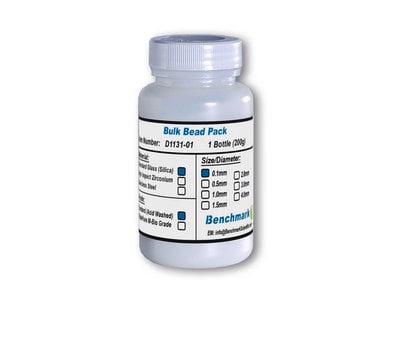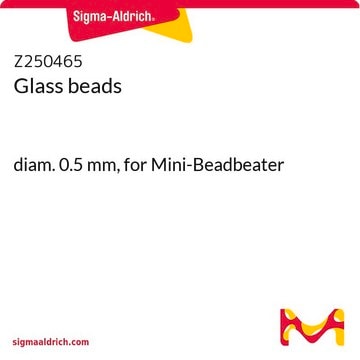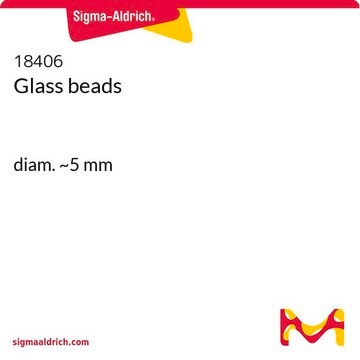G4649
Glass beads, acid-washed
≤106 μm (−140 U.S. sieve)
Synonym(s):
Glass beads
Sign Into View Organizational & Contract Pricing
All Photos(4)
About This Item
UNSPSC Code:
41102422
NACRES:
NB.22
Recommended Products
particle size
≤106 μm (−140 U.S. sieve)
Related Categories
Application
Acid-washed glass beads have been used:
- in the homogenization of mice retinas to extract and detect phosphatidylinositol
- to extract RNA from Lactarius quietus ectomycorrhizas (ECMs)
- to extract cytokinin-binding proteins (CBP) from Synechocystis lysate
Storage Class Code
11 - Combustible Solids
WGK
WGK 3
Flash Point(F)
Not applicable
Flash Point(C)
Not applicable
Personal Protective Equipment
dust mask type N95 (US), Eyeshields, Gloves
Certificates of Analysis (COA)
Search for Certificates of Analysis (COA) by entering the products Lot/Batch Number. Lot and Batch Numbers can be found on a product’s label following the words ‘Lot’ or ‘Batch’.
Already Own This Product?
Find documentation for the products that you have recently purchased in the Document Library.
Customers Also Viewed
Possible involvement of cyanobacteria in the formation of plant hormonal system
Shevchenko G V, et al.
Russian Journal of Plant Physiology, 61(2), 154-159 (2014)
Danielle France et al.
FEBS letters, 591(4), 581-589 (2017-01-29)
The ciliated protozoan Vorticella convallaria is noted for its exceptionally fast adenosine triphosphate-independent cellular contraction, but direct measurements of contractile force have proven difficult given the length scale, speed, and forces involved. We used high-speed video microscopy to image live
Yoko Hayashi-Takanaka et al.
Nucleic acids research, 39(15), 6475-6488 (2011-05-18)
Histone modifications play an important role in epigenetic gene regulation and genome integrity. It remains largely unknown, however, how these modifications dynamically change in individual cells. By using fluorescently labeled specific antigen binding fragments (Fabs), we have developed a general
Gene Transcription in Lactarius quietus-Quercus petraea Ectomycorrhizas from a Forest Soil.
Corty PE, et al.
Applications of Environmental Aquatic Chemistry: A Practical Guide, Second Edition, 74(21), 6598?6605-6598?6605 (2008)
Xingsheng Hou et al.
PloS one, 9(12), e114435-e114435 (2014-12-17)
FlcA is a response regulator controlling flocculation and the morphological transformation of Azospirillum cells from vegetative to cyst-like forms. To understand the cellular responses of Azospirillum to conditions that cause morphological transformation, proteins differentially expressed under flocculation conditions in A.
Our team of scientists has experience in all areas of research including Life Science, Material Science, Chemical Synthesis, Chromatography, Analytical and many others.
Contact Technical Service














